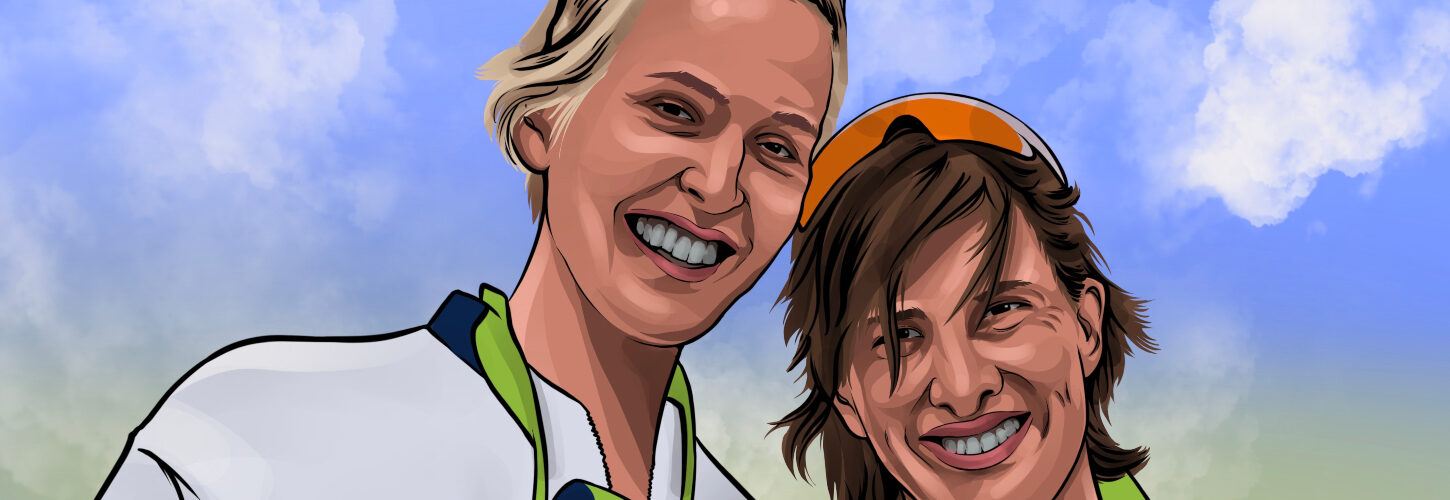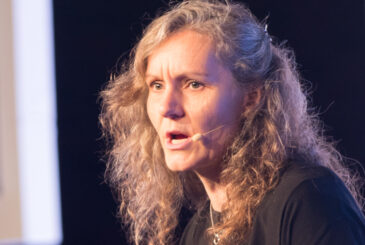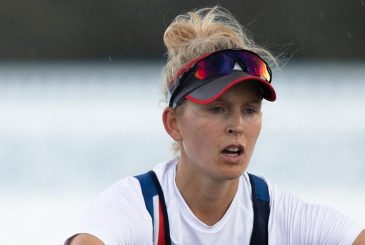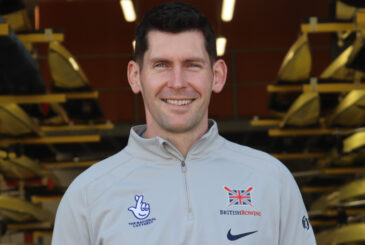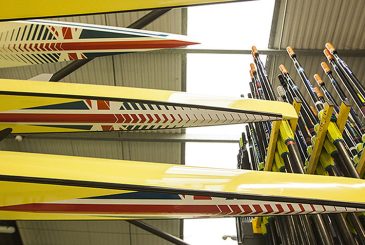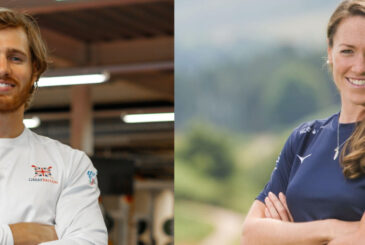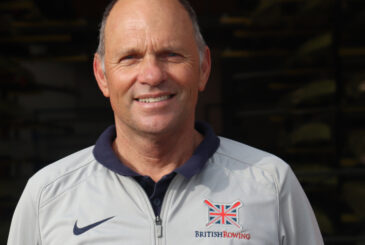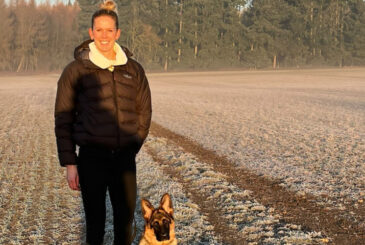In the last article of our iconic Olympic finals’ series, Martin Cross revisits the amazing women’s doubles sculls showdown at the 2016 Rio Games where Katherine Grainger and Vicky Thornley put in a stunning performance on the Lagoa Rodrigo de Freitas
They were the two top female athletes in the British Olympic rowing team. Yet back in that 2015/2016 season it seemed that nothing had gone right for Katherine and Vicky. At the Europeans, their double was too slow, so they ended that project and asked if they could be seat-raced for places in the British eight. After what was a controversial series of trials the two women were told they hadn’t made the eight. Both were at an emotional low. With just over a couple of months to go to the Rio Olympics, it looked like their dreams might be shattered.
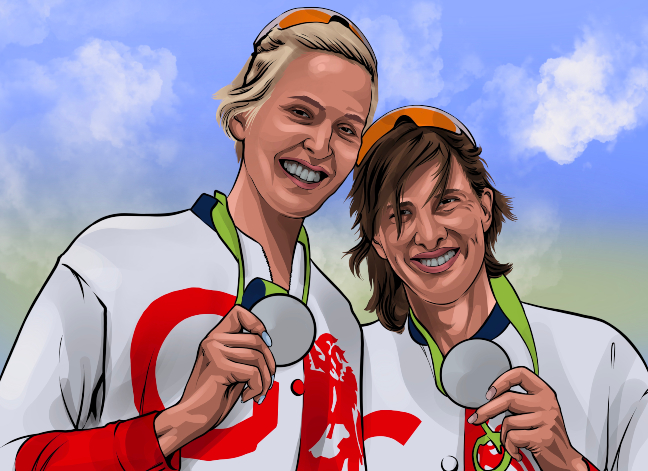
Fast-forward to August 2016 with 500m left to go. Improbably, Grainger and Thornley had led their Olympic doubles final through every mark. They were now locked into an epic ‘bow-ball to bow-ball’ battle for the gold medal with the double from Poland. The outcome of that contest was in doubt until deep into the last 500m. In the end the Poles prevailed by 0.9 seconds.
However, just how had the British women turned themselves from ‘also-rans’ to genuine gold-medal contenders? Martin Cross spoke to Katherine and Vicky to find out the story of that incredible season.
Katherine: Because we’re quite different sort of shapes and physiologies and lengths, our double wasn’t the most immediate natural fit, but it’s the mentality bit that for me was really important. I think the exciting thing was that we were very similar in that area and we were excited about the opportunity and also in our potential. Our first season was in 2015 and it was all about Olympic qualifying. I remember it being incredibly tight racing.
Vicky: I can never remember if we were fifth or sixth at the Worlds that year. [They were sixth] We qualified, but it wasn’t a result we were particularly pleased with. We both still had to go through selection to get in the boat again in 2016. Katherine and I were officially selected, after the final trials, for the first regatta, which was the Europeans in Brandenburg.
Katherine: That winter, we did a lot of swapping around and a lot of training and trialling with our group of four scullers. We were all absolutely brilliant scullers, yet in the training none of the doubles’ combinations were really flying and there was a bit of a frustration that none of them were really the kind of the clear standout obvious choice for the summer.
We’d had a really good winter – Vicky had an exceptional winter – and yet the boat wasn’t showing real speed so, although we went to the Europeans to find out how fast we were, there was the sense that something needed to be unlocked, but we hadn’t unlocked it yet. Coming fourth in Brandenburg was a disappointment.
“As it turned out, we narrowly failed to make the eight and it was devastating”
Vicky: I’d been to one Games and come fifth. Now it was all about stepping onto the podium for the next one. So, at that point I was thinking, this double does have so much potential, it should go quick, but at that point we weren’t quite seeing it.
We did speak about the possibility of switching to the eight in February. Then we decided that we’d go for the double at the Europeans to see where we were at. The frustrating thing about that regatta was that the conditions were a bit of a nightmare. It didn’t feel like it was a true test of where we were at, but equally, it didn’t go how we wanted it to.
When we came back from the Europeans we started talking about switching boats. Katherine and I never fell out about anything. We communicated well through it, but it was a very difficult process, particularly with the women’s eight. They’d won at the Europeans and now they had to open their boat up to trials to see if we could make the eight go faster.
“It was the first time I hadn’t ever turned up to Caversham. I’d never been at such an emotional low”
Katherine: It was getting very, very close to the Games, but the double didn’t feel a great option right now. Yet, choosing something different at that point was a pretty risky strategy. We were very conscious that although we operate as a big squad system, the other boats were now feeling quite established and didn’t really want to be seat-raced. However, Vicky and I had proved through trials that we were two of the top athletes in the squad and we were still ambitious enough to have the best shot we could. So, we began a process of seat-racing to try and get into the eight. As it turned out, we narrowly failed to make the eight and it was devastating.
Afterwards, I remember coming back to Caversham and thinking how on earth do we go forward? What do we do now? There’s definitely a romantic side of me that kind of believes there will be a way through this, but right now, I cannot for the life of me see it. At that point, Vicky, you took a bit of time off, didn’t you? And I remember a few days training at Caversham on my own.
“The most important thing is just to think about your own path and get yourselves right”
Vicky: It was the first time that I hadn’t ever turned up to Caversham. I’d never been at such an emotional low. I just needed a moment. And I remember going for a walk out the back of my house in the forest. I was thinking, ‘this is a pivotal moment in your career when you need to figure out if you are going to go for it’.
I had to get some reserves from somewhere – get the energy back because, yeah, at that point, I was spent, emotionally and physically. But then I also believed I was still in the best shape of my life. Then when we went back out for our first row in the double it was like heaven because we’d just left everything on the bank. Rowing just seemed so simple. We’d left all the politics on the side and I fell back in love with rowing.
It was quite close to racing the last World Cup, so we had a week or something maybe to get back in the double before we raced. It was like: ‘Let’s get on with it’. We’ve committed to it; let’s find the most we can. That was the mission: to find as much boat speed as we could before the Games.
Katherine: To Vicky’s point, it was hard, and we had to get back on track. I remember being in a car park in Henley, and it was when Di Ellis was still around. She was just a legend in her own lifetime.
Di very casually asked how things were. I think we’d been sort of named as a double, but it felt like we were at the start of a very big mountain. Our time was running out. And I remember, sort of saying to her, ‘You know, it’s tough. The percentages aren’t looking good and other boats have been racing World Cups and medalling’. And she very calmly, and quietly, said: ‘Yes, but you two, you’re on a different path now. And you know the most important thing is just to think about your own path and and get yourselves right’.
There was an incredible wisdom and insight in that, but also complete simplicity. I think we had to shift from comparing ourselves to the other boats to just focusing on ourselves, one day at a time.
The biggest shift for me wasn’t necessarily about where we got speed or re-found our technical sort of ‘click’, it was actually just the mentality of now it’s about this small project. This is the road we’re on, and we’re going to make the most of it.
Vicky: When we got to our training camp in Varese that’s when I just knew it felt better and we could probably race properly with that kind of boat-feel underneath us. However, I don’t think we necessarily had any expectations. We were very focused on moving the boat better together and that was consuming us – and that’s all we were focused on and trying to do.
“Before the final I thought something special is going to happen tomorrow”
Katherine: Once in Rio, I knew that every time we went to race – of all the crews out there, I felt we would gain the most, because we had so much learning to do. Every race would actually give us a huge amount. I think I felt that could be one of our advantages there.
I remember, being second in our semi behind Poland and being pretty pleased with that because that puts you there or thereabouts.
One of my strongest memories is coming out of the semis and doing the BBC interviews. I think Vicky was talking to John Inverdale. At that point, Steve Redgrave slightly pulled me aside and said: ‘The Kiwis are gone’. And I was like: ‘What do you mean, they’ve gone?’. I was thinking, I don’t know where they’ve gone, but okay they’ve gone somewhere… And then he said: ‘No, they’ve gone, they’ve not made the final’. They were favourites – the reigning world champions. They were the ones that would have had the gold medal around the neck if you’d put money on it before, and suddenly they’d come fourth in the semi.
It’s a really weird thing I think when the favourites have that sort of upset; it sort of throws everything a bit out of kilter, in a way that worked for us.
So, I think by the final there was a sense that anything could happen. When you get yourself to the start-line of the Olympic final there’s still everything to do, but at the same time there’s a sense of freedom. We felt that we’d really earned our place on the start-line and now let’s just see what we can do.
I remember there was an emotional point of view and Vicky’s right that you try not to make it too emotional in those moments, but there was a real sense of – I don’t know… it’s like defiance, just being there and racing. And so there’s that sort of emotion flooding through and I think it does elevate things to a whole different level.
Vicky: I don’t know why I felt like this, but before the final I thought something special is going to happen tomorrow. I just had the sense that it was all coming together. It’s weird because you can never really put your finger on feelings like that and they’re not something you can generate, they’re just within.
Katherine: And you think you’re not romantic?
Vicky: At that point, I have to be.
Katherine: Yeah, there’s nothing left to rely on but magic.
Vicky: Yeah, exactly…
Katherine: There was a really slogging head wind and it was just never much fun. It meant that the start [to the final] was rough, and we didn’t take the first stroke. We literally had one where the whole boat tipped and one of the blades didn’t come out or didn’t go in, or something, so that was partly what then drove us on so fast to the first marker, where we led. I think we got that adrenaline surge. It’s like whoa, that’s not how you want to do the first stroke of your Olympic final…
“It was completely Katherine absolutely nailing her job, so I felt I just needed to do my job”
Vicky: I remember calling going into the second 500m and thinking: ‘This is our 500m’. Then, I remember being at some point in the middle of the race and thinking, ‘Oh right, we’re leading, and then being like – oh! – this is the Olympic final!’. It was like a split-second thought, I mean obviously your focus goes straight back, but I remember that being a thought.
Then it was like, how do we keep leading? We went through the ‘k’ and the 1,500m marks in front and I just knew absolutely that Katherine had control. Because it was a quite a big head wind, the rate was just naturally down, but it felt exactly right for the conditions. It was completely Katherine absolutely nailing her job, so I felt I just needed to do my job.
Katherine: I remember being surprised that the Lithuanians weren’t closer and that there were some really classy crews there and some of the classiest ones hadn’t made the final. So, towards the end of the last 500 meters, it did feel as though it was just the Poles and us.
Vicky: I was never really thinking about anybody else bar the Poles because I felt that there was enough of a margin behind us, and our boat felt good. I’m not sure when the Poles actually got through us – maybe with 150m to go? I was trying to call the right things to hold them off. They obviously just had that bit more momentum, but it’s about executing your race. Yes, we were very close to winning, but we just executed the best race that we’d ever done in that combination on the day, under the biggest pressure, on the biggest sporting stage. And it resulted in the Olympic silver medal.
“That race and result was probably the most extraordinary of my entire career”
Katherine: When I watched it back, I wished I hadn’t seen it that night because you can’t help but go with the ‘what if?’ question. We were that close to pulling off the biggest coup in Olympic history and you think there’s no way, considering our lead-up, that we should have been in any position to potentially win the Olympic Games. But, somehow, we’d put ourselves in such a position that we almost did. When I put myself back into those dying stages of the race, I am convinced that there’s absolutely nothing more that we could have done. We did the best race we’d ever done by a long way on that day, and I really think we found something special. I’m really proud of what we did there.
Vicky: For me, continuing to row for the next four years – now five – that experience has given me a massive amount of confidence that I just hadn’t had before. I now believe that I’m good enough to stand on an Olympic podium and I finally showed my true potential.
Everything that I learned from rowing with Katherine in those two years has been so integral in the last five years because it’s not been an easy ride, but definitely what we achieved has been massive in keeping my head slightly above water, especially when I felt like I was drowning.
Katherine: I was realistically facing up to my fifth Olympic Games. And for me, there was a real pride thing. I didn’t want to come back without delivering.
In some of those really dark days in the lead-up, facing up to what would have felt like immense failure was really stark.
At the end, that race and that result was probably in every way the most extraordinary of my entire career, in that it was the most challenging route by a long way compared with anything else I’ve ever done. And probably the hardest -physically and emotionally and mentally in a lot of different ways. I’m really proud of that.
I’m in a very different role now and in a very different job; a very different world and yet there’s loads I probably take from that whole summer. The experience of what’s possible when your backs are against the wall and you think there’s no options left, and nothing is going in your favour. There are still really special things that can come up.
What it gave to me was that sense of wonder that I probably had on my first day of my Olympic career and it was there on my last day, so I was very lucky in that sense.
Illustration: Syahrulhart / Fiverr


